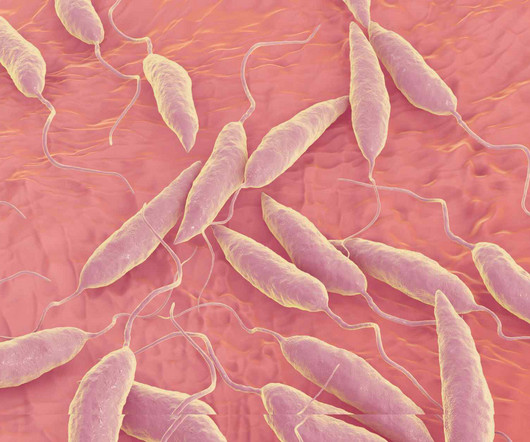Unprecedented ocean heating shows risks of a world 3°C warmer
Science Daily: Pharmacology News
JANUARY 31, 2024
New research examines the causes of the record-breaking ocean temperatures witnessed in 2023.

Science Daily: Pharmacology News
JANUARY 31, 2024
New research examines the causes of the record-breaking ocean temperatures witnessed in 2023.

Smart Data Collective
JANUARY 3, 2024
We have talked about how big data is beneficial for companies trying to improve efficiency. However, many companies don’t use big data effectively. In fact, only 13% are delivering on their data strategies. We have talked about the importance of data quality when you are running a data-driven business.
This site is protected by reCAPTCHA and the Google Privacy Policy and Terms of Service apply.

Public Health Newswire
JANUARY 23, 2024
Nation must rapidly phase out fossil fuel use, subsidies, report co-author says

The New Social Worker
JANUARY 1, 2024
We realized we’ve each used a similar pattern to make small, positive changes in our lives. As a self-care approach, it gives a structure that can be replicated. We named the pattern ARC. Appreciate, Recognize, Construct. Give it a try.

Gideon
JANUARY 17, 2024
Leishmaniasis, a parasitic infectious disease spread by sandflies, was once considered a Neglected Tropical Disease (NTD). However, leishmaniasis, also known as ‘black fever’ (kala-azar) may now be endemic to other regions, including the United States. Read more about it on the GIDEON blog. The post Understanding Leishmaniasis: Causes, Symptoms, Treatment, and More appeared first on GIDEON.

EpidemioLogical
JANUARY 1, 2024
We often strive for a home that’s a picture of order and tranquility, a personal Eden where everything is in its perfect place.
Public Health Engage brings together the best content for public health professionals from the widest variety of industry thought leaders.

Smart Data Collective
JANUARY 10, 2024
AI technology has played a crucial role in the future of cybersecurity. According to Grand View Research, cybersecurity providers spent over $16.4 billion on AI in 2022. This figure is projected to grow over 24.3% a year through 2030.

Public Health Newswire
JANUARY 23, 2024
Nation must rapidly phase out fossil fuel use, subsidies, report co-author says

The New Social Worker
JANUARY 15, 2024
Resiliency is not a fixed construct or static experience. As you embrace a self-care practice that you feel good about, resiliency increases. How will you use the lifeline of self-care to power up your resiliency?

Gideon
JANUARY 3, 2024
Some of the most common infections in the world are spread by worms found in soil. The term ‘helminth’ is another word for worm, and soil-transmitted helminth (STH) infections affect 1.5 billion people, according to the World Health Organization (WHO). While these infections are less common in the United States, UK, and other developed countries, you can get worm infections from your pets, particularly dogs and cats.

The NACCHO Podcast Series
JANUARY 26, 2024
On this week’s podcast, the National Association of County and City Health Officials ’ Victoria Van de Vate, Director of Government Affairs, and Lauren Mastroberardino, Government Affairs Senior Specialist, cover the appropriations process and give an update on government funding, including rescissions of unobligated funds. They also discuss NACCHO’s 2024 legislative and policy agenda, highlighting this year’s most important issues for local public health.

Science Daily: Pharmacology News
JANUARY 11, 2024
Restricting calories is known to improve health and increase lifespan, but much of how it does so remains a mystery, especially in regard to how it protects the brain. Scientists have now uncovered a role for a gene called OXR1 that is necessary for the lifespan extension seen with dietary restriction and is essential for healthy brain aging.

Smart Data Collective
JANUARY 1, 2024
There are many clear benefits of running a data-driven business. Unfortunately, those benefits can be quickly negated if you don’t make data integrity a priority. When we see a spam email, we almost always click the delete button too quickly, and then we wonder when it will stop.

Maternal Health Task Force
JANUARY 24, 2024
By: Katarzyna Borkowski , Former FDA ORISE Fellow, working with the Office of Medical Policy; current oncology research nurse at the NIH.; Maggie McCoy , Former Health Policy and Communications Intern with the Cure Drug Repurposing Collaboratory, currently works in communications and development at an education-focused nonprofit.; Mili Duggal , PhD, MPH, Staff Fellow in the Office of Medical Policy, CDER at FDA.

The New Social Worker
JANUARY 17, 2024
In times of war, terrorism, and violence, many people grapple with a broad range of emotions. As social workers, it is crucial for us to recognize these emotions in ourselves and manage them effectively.

EpidemioLogical
JANUARY 24, 2024
I was making a peanut butter sandwich the other night when my child asked me a tough question. It was unexpected, especially during such a mundane task, but I understand that these questions don't follow a schedule.

The Network for Public Health Law
JANUARY 23, 2024
“The year ahead is pivotal. The focus on public health has increasingly shifted to state legislatures, where ideological—rather than medical or scientific—considerations are shaping policies.” Dear Friends, As I reflect on my journey in the past year as the Executive Director of the Network for Public Health Law, the resilience and adaptability of the public health community in 2023 has been nothing short of inspiring.

Science Daily: Pharmacology News
JANUARY 8, 2024
In recent years, there has been rising concern that tiny particles known as microplastics are showing up basically everywhere on Earth, from polar ice to soil, drinking water and food. Formed when plastics break down into progressively smaller bits, these particles are being consumed by humans and other creatures, with unknown potential health and ecosystem effects.

Smart Data Collective
JANUARY 30, 2024
The AI domain is undergoing a remarkable upswing in both expansion and inventiveness. This surge is driven by advancements across various subfields and increasing adoption in diverse sectors. Global AI market projections anticipate a substantial CAGR of 37.3% within the 2023-2030 timeframe. This translates to a projected market size of approximately $1.

Gideon
JANUARY 24, 2024
In most cases, strep throat is not very serious. However, there is a more dangerous form of the infection called invasive Group A streptococcus (iGAS). Unfortunately, in 2024, there has been a notable increase in Group A streptococcal infections, mainly in children under 10, including deaths in Canada and Europe. This situation has been a cause of concern among public health experts because Group A streptococcus bacteria are crafty.

The New Social Worker
JANUARY 8, 2024
The University of Iowa 2024 National Poetry Contest for Social Workers is accepting submissions. Submit your poem by February 17, 2024.

Science Daily: Pharmacology News
JANUARY 31, 2024
Trees are struggling to sequester heat-trapping carbon dioxide (CO2) in warmer, drier climates, meaning that they may no longer serve as a solution for offsetting humanity's carbon footprint as the planet continues to warm, according to a new study.

Science Daily: Pharmacology News
JANUARY 18, 2024
Researchers have designed a self-powering, battery-free, energy-harvesting sensor. Using the framework they developed, they produced a temperature sensor that can harvest and store the energy from the magnetic field that exists in the open air around a wire.

Science Daily: Pharmacology News
JANUARY 26, 2024
Compared to robots, human bodies are flexible, capable of fine movements, and can convert energy efficiently into movement. Drawing inspiration from human gait, researchers from Japan crafted a two-legged biohybrid robot by combining muscle tissues and artificial materials. This method allows the robot to walk and pivot.

Science Daily: Pharmacology News
JANUARY 3, 2024
Mount Sinai researchers have shown for the first time that a person's beliefs related to drugs can influence their own brain activity and behavioral responses in a way comparable to the dose-dependent effects of pharmacology.

Science Daily: Pharmacology News
JANUARY 2, 2024
The African Matabele ants are often injured in fights with termites. Their conspecifics recognize when the wounds become infected and initiate antibiotic treatment.

Science Daily: Pharmacology News
JANUARY 25, 2024
An international group of leading scientists call for an urgent change in the governance of urban expansion as the world's cities continue to grow at unprecedented rates.

Science Daily: Pharmacology News
JANUARY 26, 2024
An interdisciplinary team of researchers has developed a soft implantable device with dozens of sensors that can record single-neuron activity in the brain stably for months.

Science Daily: Pharmacology News
JANUARY 16, 2024
A study exploring the mechanisms behind why cognitive performance improves in response to exercise, has found that dopamine plays a key role.

Science Daily: Pharmacology News
JANUARY 14, 2024
New research for the first time reveals the function of a little-understood junction between cells in the brain that could have important treatment implications for conditions ranging from multiple sclerosis to Alzheimer's disease, to a type of brain cancer known as glioma. Neuroscientists focused on the synapse connecting neurons to a non-neuronal cell, known as oligodendrocyte precursor cells.

Science Daily: Pharmacology News
JANUARY 8, 2024
Researchers have developed a new lithium metal battery that can be charged and discharged at least 6,000 times -- more than any other pouch battery cell -- and can be recharged in a matter of minutes. The research not only describes a new way to make solid state batteries with a lithium metal anode but also offers new understanding into the materials used for these potentially revolutionary batteries.

Science Daily: Pharmacology News
JANUARY 3, 2024
Fossils of a new group of animal predators have been located in the Early Cambrian Sirius Passet fossil locality in North Greenland. These large worms may be some of the earliest carnivorous animals to have colonized the water column more than 518 million years ago, revealing a past dynasty of predators that scientists didn't know existed.

Science Daily: Pharmacology News
JANUARY 11, 2024
Scientists have developed a way to convert carbon dioxide (CO2), a potent greenhouse gas, into carbon nanofibers, materials with a wide range of unique properties and many potential long-term uses. Their strategy uses tandem electrochemical and thermochemical reactions run at relatively low temperatures and ambient pressure and could successfully lock carbon away to offset or even achieve negative carbon emissions.

Science Daily: Pharmacology News
JANUARY 17, 2024
A 10-month mission demonstrated three elements of the plan to beam solar power from space to Earth.
Let's personalize your content